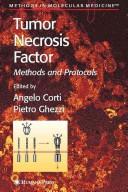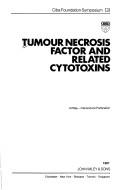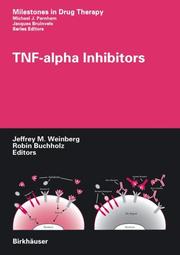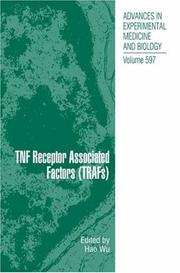| Listing 1 - 10 of 10 |
Sort by
|

ISBN: 1280360305 9786610360307 1592597718 1588292231 Year: 2004 Publisher: Totowa, NJ : Humana Press : Imprint: Humana,
Abstract | Keywords | Export | Availability | Bookmark
 Loading...
Loading...Choose an application
- Reference Manager
- EndNote
- RefWorks (Direct export to RefWorks)
Because tumor necrosis factor-a (TNF-a) plays a pivotal role in the regulation of homeostasis and inflammatory immune responses, it offers valuable research opportunities to develop new drugs for the treatment of a wide range of disorders, including cancer, septic shock, rheumatoid arthritis, and other inflammatory diseases. In Tumor Necrosis Factor: Methods and Protocols, well-versed experimentalists survey the basic and translational research being conducted in this field and describe in detail the methods they have developed for TNF production, characterization, mutagenesis, and detection in biological specimens. They also provide several in vitro assays and animal models for studying the role of TNF in various TNF-related diseases and in cancer. The protocols presented follow the successful Methods in Molecular Medicine™ series format, each one offering step-by-step laboratory instructions, an introduction outlining the principle behind the technique, lists of equipment and reagents, and tips on troubleshooting and avoiding known pitfalls. Comprehensive and highly practical, Tumor Necrosis Factor: Methods and Protocols offers molecular and cellular biologists, pharmacologists, and toxicologists a diverse set of productive, cutting-edge tools for illuminating the pathophysiological roles of TNF in disease and for identifying new drugs.
Oncology . --- Oncology. --- Tumors --- Tumor necrosis factor --- Disease Models, Animal --- Receptors, Tumor Necrosis Factor --- Tumor Necrosis Factors --- TNF Receptor Ligands --- Tumor Necrosis Factor Superfamily Ligands --- Necrosis Factors, Tumor --- Receptor Ligands, TNF --- Receptors, Cachectin --- Receptors, TNF --- TNF Receptor --- Tumor Necrosis Factor Receptor --- Cachectin Receptors --- TNF Receptors --- Tumor Necrosis Factor Receptors --- Receptor, TNF --- Receptors, Death Domain --- Animal Disease Model --- Animal Disease Models --- Disease Model, Animal --- Animals, Laboratory --- Models, Biological --- Cachectin --- Lymphotoxin --- TNF (Immunology) --- Cytokines --- Glycoproteins --- Growth factors --- Macrophages
Book
ISBN: 0081025904 0128146036 9780081025901 9780128146033 Year: 2018 Publisher: London, United Kingdom San Diego, CA, United States
Abstract | Keywords | Export | Availability | Bookmark
 Loading...
Loading...Choose an application
- Reference Manager
- EndNote
- RefWorks (Direct export to RefWorks)
Autoimmune diseases --- BCG vaccines --- Tumor necrosis factor. --- therapy. --- Therapeutic use. --- Cachectin --- Lymphotoxin --- TNF (Immunology) --- Cytokines --- Glycoproteins --- Growth factors --- Macrophages --- BCG immunotherapy --- Autoimmunologic diseases --- Autoimmunity --- Immunologic diseases
Book
ISBN: 1624177220 9781624177224 9781624177217 1624177212 Year: 2013 Publisher: Hauppauge, NY : Nova Science Publishers, Inc.,
Abstract | Keywords | Export | Availability | Bookmark
 Loading...
Loading...Choose an application
- Reference Manager
- EndNote
- RefWorks (Direct export to RefWorks)
Tumor necrosis factor. --- Chronic diseases. --- Diseases, Chronic --- NCDs (Noncommunicable diseases) --- Non-communicable diseases --- Non-infectious diseases --- Noncommunicable diseases --- Diseases --- Cachectin --- Lymphotoxin --- TNF (Immunology) --- Cytokines --- Glycoproteins --- Growth factors --- Macrophages

ISBN: 047191097X 9780471910978 Year: 1987 Volume: 131 Publisher: Chichester New York Toronto Wiley
Abstract | Keywords | Export | Availability | Bookmark
 Loading...
Loading...Choose an application
- Reference Manager
- EndNote
- RefWorks (Direct export to RefWorks)
Tumor necrosis factor --- Cytokines --- Lymphotoxin-alpha --- Tumor Necrosis Factor --- Congresses --- Lymphotoxin-alpha. --- Tumor Necrosis Factor-alpha. --- -Tumor necrosis factor --- -Cachectin --- Lymphotoxin --- TNF (Immunology) --- Glycoproteins --- Growth factors --- Macrophages --- Cellular immunity --- Immune response --- Regulation --- -Congresses --- Tumor Necrosis Factor-alpha --- Cachectin-Tumor Necrosis Factor --- TNF Superfamily, Member 2 --- TNFalpha --- Cachectin --- TNF-alpha --- Tumor Necrosis Factor Ligand Superfamily Member 2 --- Cachectin Tumor Necrosis Factor --- Tumor Necrosis Factor alpha --- Certolizumab Pegol --- Adalimumab --- Infliximab --- Necrosis --- Tumor Lysis Syndrome --- Lymphotoxin-alpha3 --- Soluble Lymphotoxin-alpha --- alpha-Lymphotoxin --- TNF Superfamily, Member 1 --- TNF-beta --- Tumor Necrosis Factor Ligand Superfamily Member 1 --- Tumor Necrosis Factor-beta --- Lymphotoxin alpha --- Lymphotoxin alpha3 --- Lymphotoxin-alpha, Soluble --- Soluble Lymphotoxin alpha --- Tumor Necrosis Factor beta --- alpha Lymphotoxin --- Kankercellen. (Congres) --- Gezwellen (Kwaadaardige). (Congres) --- Cytotoxinen. (Congres) --- Antinéoplastiques. (Congrès) --- Cellules cancéreuses. (Congrès) --- Tumeurs malignes. (Congrès) --- Cytotoxines. (Congrès) --- Antineoplastische middelen. (Congres) --- Tumor necrosis factor - Congresses --- Cytokines - Congresses --- Lymphotoxin-alpha - congresses --- Tumor Necrosis Factor - congresses
Book
ISBN: 0191768588 1283581272 9786613893727 0191548979 9780191548970 9780191768583 9780199208166 0199208166 9781283581271 6613893722 Year: 2008 Publisher: Oxford : Oxford University Press,
Abstract | Keywords | Export | Availability | Bookmark
 Loading...
Loading...Choose an application
- Reference Manager
- EndNote
- RefWorks (Direct export to RefWorks)
This book provides a comprehensive distillation of the clinical experience with Tumor Necrosis Factor (TNF) blocking therapy drugs combined with the diverse available databases to provide practical information about the use of these drugs in daily practice.
Biological products --- Tumor necrosis factor --- Cachectin --- Lymphotoxin --- TNF (Immunology) --- Cytokines --- Glycoproteins --- Growth factors --- Macrophages --- Biotherapy --- Therapeutic use. --- Inhibitors. --- Gastrointestinal Diseases --- Rheumatic Diseases --- Skin Diseases --- Tumor Necrosis Factor-alpha --- Therapeutic use --- Inhibitors --- therapy --- therapeutic use

ISBN: 1280615702 9786610615704 3764374381 3764372486 Year: 2006 Publisher: Basel ; Boston : Birkhauser Verlag,
Abstract | Keywords | Export | Availability | Bookmark
 Loading...
Loading...Choose an application
- Reference Manager
- EndNote
- RefWorks (Direct export to RefWorks)
Over the last decade, the advent of biologic agents has greatly revolutionized therapeutic medicine in the management of chronic inflammatory diseases, such as rheumatoid arthritis, Crohn’s disease, and psoriasis. Elucidation of the complex web of cytokine network and the roles of these cytokines in the pathogenesis of inflammatory disorders provided one of the key catalysts for the advancement of targeted biologic therapy in autoimmune and inflammatory diseases. TNF-alpha is known to play a crucial role in the pathogenesis of many chronic inflammatory diseases. Elevated levels of TNF-alpha have been demonstrated in Crohn’s disease, psoriasis, psoriatic arthritis, and rheumatoid arthritis, suggesting a role for TNF-alpha in their pathogenesis. Although TNF-alpha plays a critical role in the activation of innate and acquired immune responses, the persistence of the immune response and inappropriate production of TNF-alpha can produce pathological changes resulting from chronic inflammation and tissue damage. This volume provides a comprehensive overview of the development, pharmacology, efficacy, and safety of the currently available TNF-alpha inhibitors – etanercept, infliximab, and adalimumab. The most recent preclinical and clinical data is presented on this topic, which should be of interest to the preclinical researcher, the clinician, and the patient who wants to learn more about these therapies.
Tumor necrosis factor --- Anti-inflammatory agents. --- Inhibitors. --- Anti-inflammatories --- Antiinflammatory agents --- Antiphlogistics --- Antipyretics --- Inflammation --- Cachectin --- Lymphotoxin --- TNF (Immunology) --- Cytokines --- Glycoproteins --- Growth factors --- Macrophages --- Immunology. --- Rheumatology. --- Dermatology. --- Toxicology. --- Gastroenterology. --- Pharmacology/Toxicology. --- Internal medicine --- Digestive organs --- Chemicals --- Medicine --- Pharmacology --- Poisoning --- Poisons --- Skin --- Connective tissues --- Joints --- Immunobiology --- Life sciences --- Serology --- Diseases --- Toxicology --- Pharmacology. --- Gastroenterology . --- Drug effects --- Medical pharmacology --- Medical sciences --- Chemotherapy --- Drugs --- Pharmacy --- Physiological effect

ISBN: 1281140651 9786611140656 0387706305 0387706291 1441924205 Year: 2007 Publisher: New York : Austin, Tex. : Springer Science+Business Media ; Landes Bioscience,
Abstract | Keywords | Export | Availability | Bookmark
 Loading...
Loading...Choose an application
- Reference Manager
- EndNote
- RefWorks (Direct export to RefWorks)
It has been established that TNF receptor associated factors (TRAFs) are critical signaling mediators for not only the TNF receptor superfamily, but also the interleukin-1 receptor/Toll-like receptor superfamily and the T-cell receptors. They play important roles in mammalian biology including embryonic development, innate and adaptive immune regulation and maintenance of cellular homeostasis. Agents that manipulate the signaling of these receptors are being used or showing promise towards the treatment and prevention of many human diseases such as rheumatoid arthritis, coronary heart disease, transplantation rejection, insulin resistance, multiple organ failure and cancer. TNF Receptor Associated Factors is the only literature that is entirely devoted to TRAFs. Almost every aspect of TRAF signaling is covered, including the different TRAF family members, their distinct biological functions, the TRAF structures, their modes of receptor recognition, the signaling mechanisms, and the roles of TRAFs in normal cellular functions and in viral infection. TNF Receptor Associated Factors is intended for a wide audience, including researchers in the field of TRAF signaling and students and postdoctoral fellows learning cell biology and cell signal transduction. This exciting new volume is up to date on the most recent advances in TRAF signal transduction.
Tumor necrosis factor --- Cellular signal transduction. --- Receptors. --- Cellular information transduction --- Information transduction, Cellular --- Signal transduction, Cellular --- Bioenergetics --- Cellular control mechanisms --- Information theory in biology --- Cachectin receptors --- Receptors, Tumor necrosis factor --- TNF receptors --- TNFRs (Tumor necrosis factor receptors) --- Tumor necrosis factor receptors --- Cell receptors --- Death receptors --- Cytology. --- Developmental biology. --- Computer security. --- Cell Biology. --- Developmental Biology. --- Systems and Data Security. --- Computer privacy --- Computer system security --- Computer systems --- Computers --- Cyber security --- Cybersecurity --- Electronic digital computers --- Protection of computer systems --- Security of computer systems --- Data protection --- Security systems --- Hacking --- Development (Biology) --- Biology --- Growth --- Ontogeny --- Cell biology --- Cellular biology --- Cells --- Cytologists --- Protection --- Security measures --- Cell biology.
Book
ISBN: 1441927999 0387895191 9786612361234 1282361236 0387895205 Year: 2009 Publisher: New York, N.Y. : Austin, Tex. : Springer Science+Business Media ; Landes Bioscience,
Abstract | Keywords | Export | Availability | Bookmark
 Loading...
Loading...Choose an application
- Reference Manager
- EndNote
- RefWorks (Direct export to RefWorks)
Tumor necrosis factor (TNF) superfamily is a rapidly growing family of cytokines that interacts with a corresponding superfamily of receptors. Ligand-receptor interactions of this superfamily are involved in numerous biological processes ranging from hematopoiesis to pleiotropic cellular responses, including activation, proliferation, differentiation, and apoptosis. The particular response depends on the receptor the cell type, and the concurrent signals received by the cell. Worldwide interest in the TNF field surged dramatically early in 1984 with the cloning and defining of the profound cellular effects of the first member of this family, TNFa. Subsequently, the major influence of TNFa on the development and functioning of the immune system was established. Today, over 20 human TNF ligands and their more than 30 corresponding receptors have been identified. Few receptors still remain orphans. What has emerged over the years is that most TNF ligands bind to one distinct receptor and some of the TNF ligands are able to bind to multiple TNF receptors, explaining to some extent the apparent disparity in the number of TNF receptors and ligands. Yet, in spite of some redundancy in TNF ligand/receptor interactions, it is clear that in vivo spatial, temporal, and indeed cell- and tissue-specific expression of both ligands and their receptors are important factors in determining the precise nature of cellular physiological and pathological processes they control. Therapeutic Targets of the TNF Superfamily presents the state-of-the art account on the role of TNF superfamily members in the pathogenesis and their use in current intervention of cancers and autoimmune disease. This text will be highly valuable for investigators to understand the disease processes regulated by TNF superfamily members and to develop effective therapeutics. A view into the future, inspired by the comprehensive work presented in this volume, predicts that researchers studying TNF superfamily members will continue to make rapid progress in identifying relevant components to the disease process and new therapeutic strategies to target many human diseases including cancers, autoimmune disease and others.
Tumor necrosis factor --Agonists --Therapeutic use. --- Tumor necrosis factor. --- Tumor necrosis factor --- Autoimmune Diseases --- Tumor Necrosis Factors --- Receptors, Tumor Necrosis Factor --- Neoplasms --- Inflammation --- Drug Therapy --- Immune System Diseases --- Diseases --- Intercellular Signaling Peptides and Proteins --- Pathologic Processes --- Cytokines --- Receptors, Cytokine --- Therapeutics --- Pathological Conditions, Signs and Symptoms --- Peptides --- Biological Factors --- Proteins --- Analytical, Diagnostic and Therapeutic Techniques and Equipment --- Receptors, Immunologic --- Amino Acids, Peptides, and Proteins --- Chemicals and Drugs --- Receptors, Cell Surface --- Membrane Proteins --- Microbiology & Immunology --- Biology --- Health & Biological Sciences --- Agonists --- Therapeutic use --- Therapeutic use. --- Cachectin --- Lymphotoxin --- TNF (Immunology) --- Medicine. --- Immunology. --- Biomedicine. --- Biomedicine general. --- Immunobiology --- Life sciences --- Serology --- Clinical sciences --- Medical profession --- Human biology --- Medical sciences --- Pathology --- Physicians --- Glycoproteins --- Growth factors --- Macrophages --- Biomedicine, general. --- Health Workforce
Book
ISBN: 1441966110 9786613080479 1441966129 1283080478 Year: 2010 Publisher: New York : Springer,
Abstract | Keywords | Export | Availability | Bookmark
 Loading...
Loading...Choose an application
- Reference Manager
- EndNote
- RefWorks (Direct export to RefWorks)
The biennial TNF-family conferences have been held over the past 20 years, from the time that TNF was cloned. These meetings have followed the enormous progress in this field. Much is now known about the members of the TNF ligand and receptor families, their signaling proteins, mechanisms of action and cellular functions. This volume is the proceedings of the 12th TNF International Conference, held in April 2009. This conference focuses on the physiological, pathophysiological, and medical significance of these important regulators. Sessions at the meeting specifically address their involvement in immunity, development, apoptosis, autoimmunity, cancer, and infection, the normal function and pathology of the neuronal system, as well as major unresolved questions about their mechanisms of action.
Cell death -- Congresses. --- Cytokines -- Congresses. --- Tumor necrosis factor -- Congresses. --- Tumor necrosis factors -- Congresses. --- Tumor necrosis factor --- Intercellular Signaling Peptides and Proteins --- Publication Formats --- Cell Physiological Processes --- Publication Characteristics --- Proteins --- Peptides --- Biological Factors --- Cell Physiological Phenomena --- Amino Acids, Peptides, and Proteins --- Chemicals and Drugs --- Phenomena and Processes --- Cell Death --- Tumor Necrosis Factors --- Cytokines --- Congresses --- Biology --- Health & Biological Sciences --- Microbiology & Immunology --- Cachectin --- Lymphotoxin --- TNF (Immunology) --- Medicine. --- Immunology. --- Microbiology. --- Biomedicine. --- Biomedicine general. --- Microbial biology --- Microorganisms --- Immunobiology --- Life sciences --- Serology --- Clinical sciences --- Medical profession --- Human biology --- Medical sciences --- Pathology --- Physicians --- Glycoproteins --- Growth factors --- Macrophages --- Health Workforce --- Biomedicine, general.
Book
ISBN: 0128004614 0127999647 9780128004616 9780127999647 Year: 2014 Publisher: London
Abstract | Keywords | Export | Availability | Bookmark
 Loading...
Loading...Choose an application
- Reference Manager
- EndNote
- RefWorks (Direct export to RefWorks)
The Value of BCG and TNF in Autoimmunity provides an overview of current research and thinking related to tumor necrosis factor (TNF) induction and the use of the bacillus Calmette-Guérin (BCG) vaccine as potential treatment approaches to diverse forms of autoimmunity. BCG, commonly known as an anti-tuberculosis vaccine, is being explored in worldwide clinical trials as an approach to the treatment of certain forms of autoimmunity. The scope of research behind this therapeutic approach spans from the basic science of TNF signaling to research in diverse autoimmune disciplines, such
Autoimmunity. --- Cellular signal transduction. --- Tumor necrosis factor. --- Autoimmune diseases --- BCG vaccines --- Tumor necrosis factor --- Immune System Diseases --- Intercellular Signaling Peptides and Proteins --- Cytokines --- Immunity --- Tuberculosis Vaccines --- Immunomodulation --- Bacterial Vaccines --- Proteins --- Biological Therapy --- Peptides --- Biological Factors --- Immune System Phenomena --- Diseases --- Phenomena and Processes --- Amino Acids, Peptides, and Proteins --- Vaccines --- Therapeutics --- Chemicals and Drugs --- Analytical, Diagnostic and Therapeutic Techniques and Equipment --- Biological Products --- Complex Mixtures --- Tumor Necrosis Factors --- Immunotherapy --- Autoimmune Diseases --- Autoimmunity --- BCG Vaccine --- Medicine --- Biology --- Health & Biological Sciences --- Clinical Immunology --- Microbiology & Immunology --- Therapeutic use --- Receptors. --- Etiology. --- Cellular information transduction --- Information transduction, Cellular --- Signal transduction, Cellular --- Bioenergetics --- Cellular control mechanisms --- Information theory in biology --- Autoimmunologic diseases --- Immunologic diseases --- Cachectin receptors --- Receptors, Tumor necrosis factor --- TNF receptors --- TNFRs (Tumor necrosis factor receptors) --- Tumor necrosis factor receptors --- Cell receptors --- Death receptors --- Autoallergy --- Autoantibodies
| Listing 1 - 10 of 10 |
Sort by
|

 Search
Search Feedback
Feedback About UniCat
About UniCat  Help
Help News
News